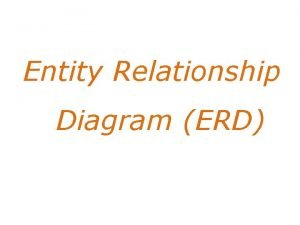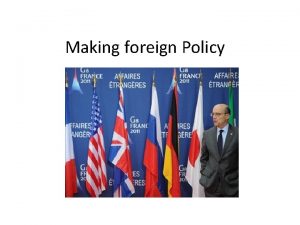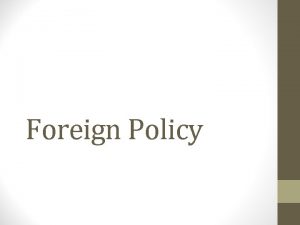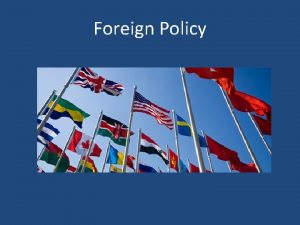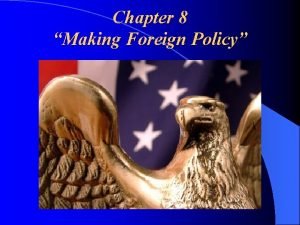Makers of Foreign Policy I Key foreign policy





- Slides: 5

Makers of Foreign Policy

I. Key foreign policy players. A. Foreign policy is a shared responsibility of the President and Congress. The system of checks and balances applies. B. Despite shared responsibilities, the President is primarily responsible foreign policy (U. S. vs. Curtiss-Wright, 1936) and has extensive support within the executive branch: 1. Secretary of State: Cabinet official responsible foreign affairs. 2. Other Cabinet officials: Since foreign policy affects domestic policy, other Cabinet officials also have input. 3. National Security Council (NSC) a. Coordinates policies that affect national security. b. Members include President, Vice President, Secretary of State, Secretary of Defense, Director of the CIA, National Security Adviser, and the chairman of the Joint Chiefs of Staff. c. National Security Adviser has emerged as a key player who sometimes has more influence than the Secretary of State. Presidents tend to rely more upon the ANSA because he is literally "closer “to the President (office in the White House) and his loyalties are not divided between the President and a Cabinet Department.

4. Office of Homeland Security: to coordinate anti-terrorism efforts. 5. State Department and its Foreign Service: responsible for day-to-day management of foreign policy. 6. U. S. Information Agency: propaganda agency that includes Voice of America and Radio Free Europe. 7. CIA. a. Functions: gather and evaluate intelligence (information about other nations). b. Created in 1947 to monitor the Soviet threat. Fall of communism since 80 s has led the agency to branch out into other areas. c. Agency’s covert operations have led to some concern about government secrecy in a democracy. d. This concern has led to the creation of intelligence oversight committees in both the House and Senate. e. Terrorist attacks of 9 -11 have, however, renewed the call for a stronger and more effective CIA. 8. National Security Agency is designed to protect U. S. government information systems. The NSA employs the country's premier cryptologists. It is said to be the largest employer of mathematicians in the United States and perhaps the world. Its mathematicians contribute directly to the two missions of the Agency: designing cipher systems that will protect the integrity of U. S. information systems and searching for weaknesses in adversaries' systems and codes.

II. Influences on foreign policy A. Public opinion. 1. Mass public, about 75%, are relatively unaware of foreign policy, except during a crisis. B. Interest groups. 1. “Think tanks” such as RAND and the Council on Foreign Relations C. Foreign nations’ lobbyists. 1. Many nations hire lobbyists to represent their interests in Washington. D. Political parties. 1. The tradition has been for the U. S. to have a bipartisan foreign policy, one that is united and not torn apart by party squabbling. For example, both political parties supported containment of communist aggression after World War II, both supported the Vietnam War, both supported the Gulf War, both supported the war on terrorism and (initially) the war in Iraq.

E. Congress. 1. Key congressional “checks” on the President 2. The trend in the 20 th century has been to give the President great discretion in the area of foreign affairs, however, there have been some notable instances of Congress asserting its authority in foreign affairs: a. Senate blockage of the Treaty of Versailles after WWI. b. Neutrality Acts of the 1930 s that tried to prevent U. S. involvement in foreign conflicts. c. Senator Fulbright’s hearings on the Vietnam War in the 1960 s that raised doubts about U. S. involvement in the war. d. War Powers Act of 1973. e. Congressional refusal to commit troops to Vietnam after North Vietnam broke the peace accords in 1975. f. Some opposition to U. S. involvement in the Gulf War. g. Senate rejection of Comprehensive Test Ban Treaty in 1999. h. Some criticism of giving Most Favored Nation status to China. i. Some criticism of Bush’s security measures (PATRIOT Act) after 9/11 terrorist attack.
